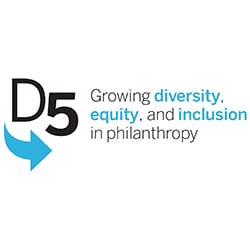 Much of the conversation on data tends toward technology. But tech doesn’t happen without people. From there, a still wider view is needed since the most robust attack on global, complex social problems requires a diverse corps of folks who have not only technical, but cultural competence. In that light, diversity, equity and inclusion are more than the expected, outward-facing ethical components of our work, but also internal measures for social sector organizations. From large foundations to multiple private sector examples to the halls of government, they have been pitched as mission-critical components. Kelly Brown, CEO of D5 Coalition, takes a look at diversity, equity and inclusion in the social sector.
Much of the conversation on data tends toward technology. But tech doesn’t happen without people. From there, a still wider view is needed since the most robust attack on global, complex social problems requires a diverse corps of folks who have not only technical, but cultural competence. In that light, diversity, equity and inclusion are more than the expected, outward-facing ethical components of our work, but also internal measures for social sector organizations. From large foundations to multiple private sector examples to the halls of government, they have been pitched as mission-critical components. Kelly Brown, CEO of D5 Coalition, takes a look at diversity, equity and inclusion in the social sector.
…
As philanthropists, we are dedicated to promoting the common good. The D5 Coalition believes that advancing diversity, equity, and inclusion (DEI) is critical to living up to that value. Greater diversity within our organizations provides a multitude of perspectives, and achieves greater equity in our grantmaking—so that we can provide opportunities for everyone to succeed.
Amidst a rapidly changing demographic landscape—such as an expanding Latino population, record numbers of women graduating from college and increasing numbers of people living with disabilities—we must ask ourselves: is philanthropy and is the social sector at large staying ahead of these trends and living up to their ideals?
Unfortunately, the answer is “we don’t know.” Answering this question requires reliable and integrated data—data about who within foundations are making decisions, and about what organizations and causes are benefitting from grantmaking. This data can help us understand who foundations are impacting, and how and who needs more help.
But when it comes to data, many foundations are silos—they track data about DEI differently, or not at all. And they share data differently, or not at all. Despite the mountains of data that foundations do collect, philanthropy still cannot speak reliably about its impact.
In addition, nonprofits operate in their own silos, and while they are increasingly charged with collecting and sharing data on their own impact, often at the request of foundations, the data about whom they serve and how is often unclear or incomplete. Strengthening the data collection capacity of the social sector is critical, and this must be done in concert with the range of partners that are using and analyzing this data.
Much more needs to be done, particularly to address the dearth of systematic data around equity-focused investments. Without addressing the silos in terms of how both philanthropy and nonprofits perceive and determine whom they are benefiting, we won’t have a good understanding of whether we are closing gaps in opportunity. Understanding who we are serving is as important as capturing the issue focus of a grant, be it education or health or workforce development or arts and culture, since those issues manifest in different communities very differently.
So what do we do about it? We have to establish a uniform data collection and reporting approach, and encourage the whole field to use it. We have to clarify who will use the data and how, and we have to identify the most effective and least burdensome ways to collect and share data. Until we do these things, we won’t know our true impact, and we won’t know if we’re doing all that’s possible to promote the common good.
D5’s ongoing work around data collection is one important step toward a common system of accountability. Attempts to develop and design such a system are being piloted and tested right now and can help provide the most current data with minimal effort. We are continuing to urge foundations to improve data collection, and share success stories as models for the field. And we are facilitating conversations with a range of partners to gather ideas about how philanthropy can take advantage of the opportunities that data presents.
While advancing DEI may seem self-evident in promoting the common good, it is the cold, hard data that will make the best case for it.
